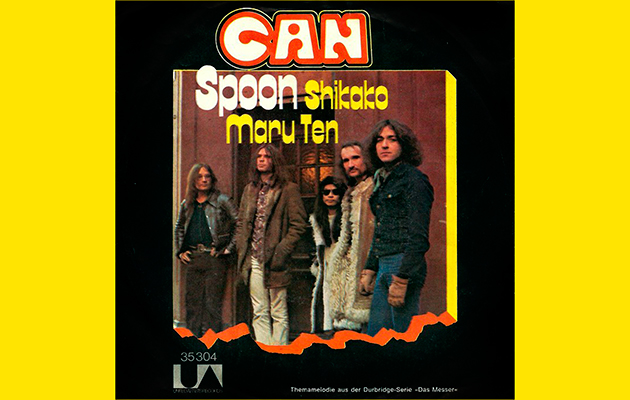Like us on Facebook to keep up to date with the latest news from Uncut.
Irmin Schmidt, Holger Czukay and Jaki Liebezeit tell the story behind the band’s hit single – Number One in Germany! This first appeared in Uncut issue 200 [January 2014]…
________
How many hit singles in 1971 started off with the sound of a drum machine? Only one: “Spoon”, by the utopian Krautrock ensemble Can, which went to Number One in their native Germany. Since 1968, Can had occupied a rehearsal/performance space at Schloss Nörvenich, a castle outside their hometown of Cologne. In the autumn of 1971, they relocated to an abandoned cinema building in the small village of Weilerswist, 20 kilometres south west of Cologne, where they set up Inner Space, a live-in sonic laboratory where they developed their unique sound and recorded all their subsequent work. A string of previous film soundtracks (including Jerzy Skolimowski’s Deep End) led them to be commissioned for the theme tune for one of German TV’s most popular detective series, known as Durbridge, based on the Tim Frazer novels of English crime writer Francis Durbridge. They submitted one of their first recordings in the new space: “Spoon”.
Unlike many of Can’s subsequent music, most of “Spoon” is the sound of Can playing live and as one. A wayard Latin beat on the rhythm box was the catalyst, but Jaki Liebezeit’s scurrying, mechanical groove, Irmin Schmidt’s stabbing synths, Michael Karoli’s searing guitar lines and Holger Czukay’s bass depth charges add up to a vintage Can dish. Damo Suzuki, the Japanese busker they’d recently picked up on the streets of Cologne, improvised a lyric about cutlery that managed to sound comical and menacing by turns.
IRMIN SCHMIDT: We had done this music for a German television programme, Millionenspiel, and that was very successful. So we were asked to do the music to Das Messer. We accepted, of course, and started working, and it was about the first thing we did in the new studio. We did our best, and then when I came with the music to the editing room, the director [Rolf von Sydow] flipped out – he didn’t like the music at all. He said, “I wanted commercial music and not some avant garde music.” He was totally against it. Big trouble – but the guys who actually commissioned the music loved it, and said, “No matter what the director says, this music should remain – it’s fabulous.” That was a few days of sleepless nights, because I thought we had done it all in vain. The film itself got very bad critics, and a hundred different papers all over Germany, even the little provincial papers, all wrote, “It’s a very mediocre Durbridge this time, but the music is extraordinary.” And we went into the charts with it.
HOLGER CZUKAY: It was no French Connection, not at all. But they played it every night, with our song at the beginning and the end. It was good for the band from that point of view.
SCHMIDT: The film is a detective story, criminal, and that’s typical Can – Can music was rarely only friendly and light hearted… Even with “Spoon”, which is a relatively light-hearted song, there is something edgy about it. When we came into this village, Weilerswist, of course we looked pretty wild, that was a very normal middle class and working class village. To them we looked so wild, people got very suspicious about us. And we started together with the work of “Spoon”, we also were working on installing and insulating the studio.
JAKI LIEBEZEIT: The first years were nice. It was a completely empty room in the beginning, the old village cinema. The cinema had given up, because everybody had got a car, to go into town, or a television. It was ten years empty, this room, so we got it and started with nearly nothing.



